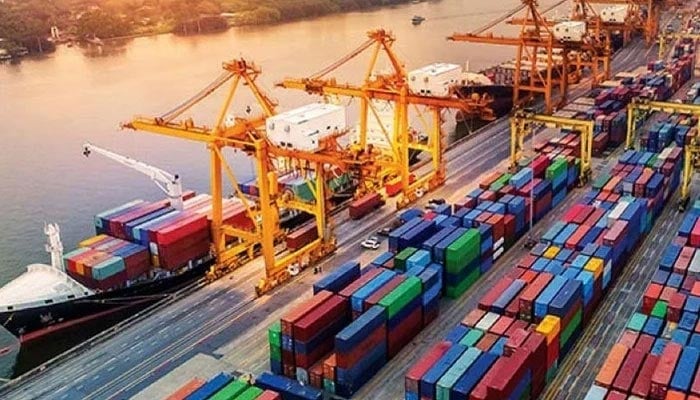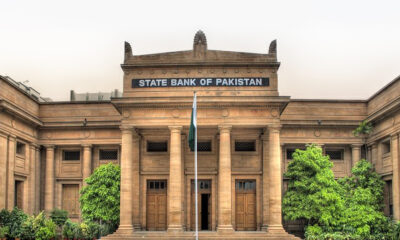- Thousands of shipping containers stuck at Karachi Port.
- Banks should facilitate import of necessary items: SBP.
- Banks reluctant in opening LCs for import of necessities.
KARACHI: Despite the State Bank of Pakistan’s (SBP) directives about import facilitation, the banks remain hesitant in opening letters of credit (LCs) for the import of necessities, posing threat to the food supply, The News reported Friday.
Due to the banks’ reluctance to guarantee foreign exchange payments, thousands of shipping containers — including perishable, and non-perishable foodstuffs and medical supplies — are stuck at the Karachi Port after offloading.
The banks show reluctance in opening letters of credit for the import of necessities like edible oil and pulses. This could also escalate price pressures and create a shortage of medications. Last month, the SBP lifted import restrictions that went into force on January 2.
“In view of the orders issued last month, the SBP has given banks the power to facilitate imports. Thus, banks are not restricted from opening LCs for the importation of essentials such as food and medicine. Banks are free to make their own decisions on the opening of LCs,” SBP spokesman Abid Qamar told The News.
According to the SBP, banks should give preference to or facilitate imports that fit into the category of necessary imports, such as those related to food (wheat, edible oil, etc.) and pharmaceuticals (raw materials, life-saving/essential medications, and surgical devices, including stents).
The SBP has also directed banks to prioritise imports of energy, goods by export-oriented businesses and inputs for agriculture.
More than 6,000 containers of pulses are stuck at ports, according to Abdul Rauf Ibrahim, chairman of the Karachi Wholesale Groceries Association. Banks have reservations about paying for these imports.
“This threatens the nation’s capacity to import these basic foods. Importers have paid shipping companies $48 million in detention fees for these stranded containers. In the month of Ramazan, there would be a new problem in the supply and cost of pulses if these containers are not released,” Ibrahim said.
Banks have been advised by SBP to prioritise certain essentials and export-related imports. However, they need to either match their own foreign currency receipts with outgoings or procure shortfalls from other banks in the interbank market, according to Ehsan Malik, the CEO of Pakistan Business Council (PBC).
“Following the wide Rs25-40 spread between the interbank rate and other open market rates, approximately Rs400 million monthly remittances from overseas Pakistanis have moved from banking channels to the havala system,” Malik said.
“The reduced availability of forex in the interbank market therefore constraints the ability of banks to meet their clients’ import needs,” he added.
The PBC has pointed out to the government that aside from political uncertainty and the outflow of dollars to Afghanistan, the main reason for the growing spread between the official and open market rates for the US dollar was hoarding in the expectation of significant devaluation of the rupee.
The spreads on other currencies is not as significant as the US dollar because they are not regarded as a store of value as much as the US dollar or gold is, and we have seen rates of both go up.
“PBC has suggested two options, aside from stemming the outflow of dollars to Afghanistan. The first is to offer PKR bonds, returns on which are linked to the movement in PKR value relative to the US dollar. This would remove the need to acquire dollars and reduce the demand pressure,” Malik said.
The second is to allow exporters and overseas Pakistanis to convert part of their export proceeds/remittances into “tradable import credits”. This would also help balance supply with demand of the dollar in the open market as well as incentivise exporters and overseas Pakistanis to remit through official channels, he explained.
Tradable import credits would also offer the opportunity of items not on the priority list of SBP to be imported. A criticism levelled against the aforementioned suggestions is that they perpetuate multiple exchange rates.
The current reality is that three rates already exist for the dollar and the above recommendations would help narrow the spread, he noted.
Malik said that as long as political and economic uncertainty prevails, there would be a spread between the interbank and open market rates and “until we learn to live within our means, there will be a shortfall of forex for imports”.
He said there was a limit to how much and for how long friendly countries and multilaterals can provide breathing space and fund our consumption.
“In the immediate time frame when our liquidity and solvency is in question, it is imperative that we secure IMF support for another programme. Even with that, we will need to find breathing space for fundamental reforms,” Malik said.
“This can be facilitated by re-profiling our debt through advice from sovereign debt advisors. Pakistan is not alone in seeking restructuring of debt. Sovereign debt advisors are engaged by over 20 countries,” he added.
Pakistan is grappling with a balance of payments crisis brought on by high foreign debt repayments and a lack of external financing, which have hammered its foreign reserves and created chronic dollar shortages.
As of January 6, the SBP’s foreign exchange reserves plummeted to almost a nine-year low of $4.3 billion, posing a significant challenge for the country in terms of financing imports.

 Latest News2 days ago
Latest News2 days ago
 Latest News2 days ago
Latest News2 days ago
 Latest News2 days ago
Latest News2 days ago
 Latest News2 days ago
Latest News2 days ago
 Latest News2 days ago
Latest News2 days ago
 Latest News2 days ago
Latest News2 days ago
 Latest News2 days ago
Latest News2 days ago
 Latest News2 days ago
Latest News2 days ago























